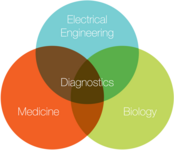
Practical course Characterization of microfluidic systems (Charakterisierung mikrofluidischer Systeme) LV-Nr.: 0000005367
| Content | The application of microfluidics in biomedical and lab-on-a-chip devices is rapidly growing due to its use for precise and fast handling of small fluid sample volumes. In this hands-on course, we cover the basic theory and concepts of the underlying microfluidics physics as well as the realization and operation of basic microfluidics devices. In the in-house facilities, the students will fabricate their own microfluidics devices, which they will use for carrying out experiments of state-of-the-art microfluidic operations. The students will perform quantitative analysis and characterization of the experiments for bridging and quantitatively comparing to theoretical predictions. In the following a more detailed course plan is listed: 1. Theory of fluid physics at the microscale Governing equations and scaling laws / basic flow solutions and the Hagen-Poiseuille law / capillary forces and diffusion / introduction to numerical simulations and the finite-element method (FEM) and COMSOL Multiphysics. 2. Basic concepts of microfabrication Photolithography processes / substrate assembly and packaging / basic concepts of soft lithography and multilayer functional elements / up-scaling of processes 3. Lab exercises and experiments Characterization of microfluidic networks via hydraulic resistance and state-of-the-art particle tracking methods Validation of basic scaling concepts in microfludiic droplet generators Characterization of flow-focusing devices for microfluidic flow cytometry applications |
| Format | Practical course |
| Language | German and English |
| Dozent | Dr. Shilpi Pandey |
| Credits | 5 ECTS |
| SWS | 5 SWS |
| Semester | WiSe/SoSe |
| Time | Kickoff: Thursday 17.04.2024, 16:00 - 16:45 (Attendance is a prerequisite for participation) |
| Place | Kickoff: TranslaTUM, seminar room first floor (22.1.27), Einsteinstraße 25 |
| Examination | The students will write a report and and give a 20-min presentation to demonstrate their achievements of learning results on concepts of fundamental theory, microfabrication, and experimental work. Most important, students review, discuss, and compare experimental findings to theoretical predictions and expections. 50 % grade of report 50 % grade of presentation |